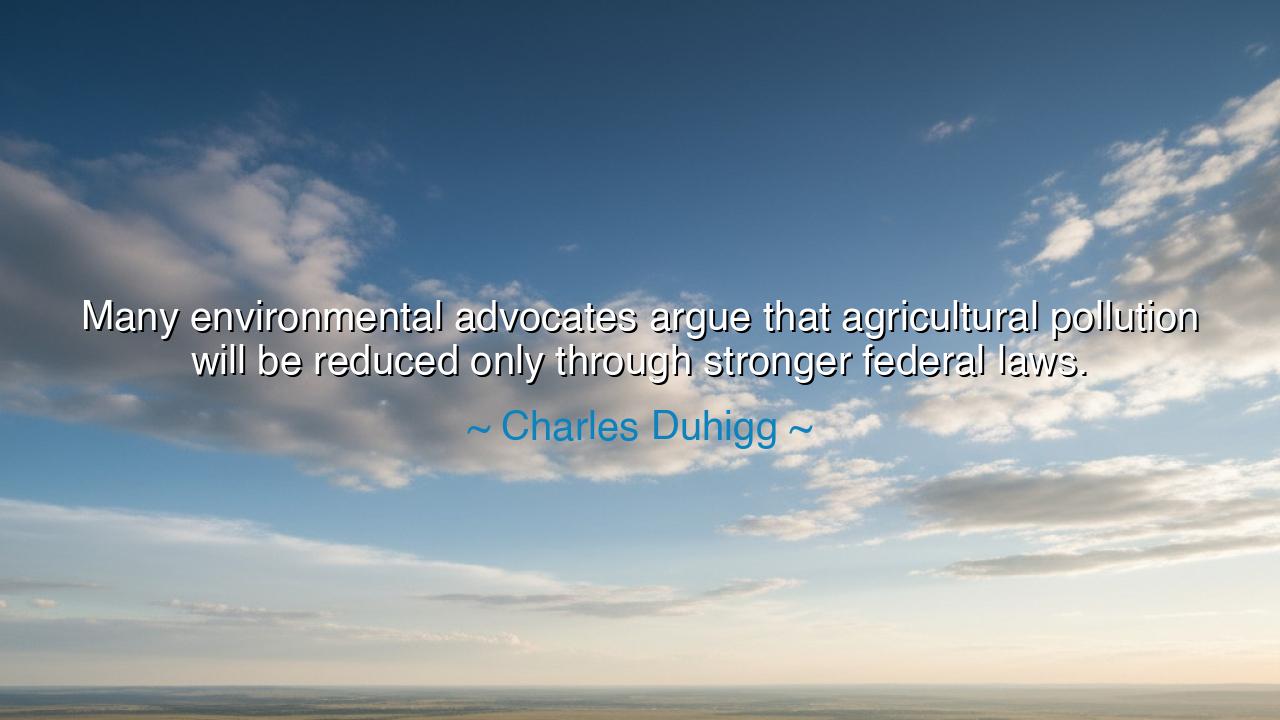
Many environmental advocates argue that agricultural pollution
Many environmental advocates argue that agricultural pollution will be reduced only through stronger federal laws.






Hear the words of Charles Duhigg, who, with the clarity of a chronicler, declared: “Many environmental advocates argue that agricultural pollution will be reduced only through stronger federal laws.” This statement, though plain, strikes upon one of the deepest struggles of our age: the tension between the boundless hunger of agriculture and the fragile health of the earth. In his words, we hear both the lament of advocates who see rivers poisoned and skies darkened, and the call for power greater than local custom or voluntary restraint—a call for the might of law to shield the land itself.
For what is agricultural pollution but the unintended shadow of humanity’s need to eat? Fertilizers meant to grow crops flow into rivers, birthing dead zones in the seas. Pesticides that defend fields poison bees and birds alike. Animal waste from vast farms leaches into groundwater, bringing sickness to those downstream. The individual farmer may say, “I only seek to feed,” yet the cumulative weight of millions of such acts becomes a burden too great for streams, soil, and air to bear. Thus, the advocates cry: only federal laws, strong and binding, can bring order to this chaos and compel all to bear responsibility.
History gives us examples of this very struggle. Recall the Cuyahoga River in Ohio, which in the twentieth century became so polluted with industrial and agricultural waste that it caught fire, its waters burning like oil. Local will alone could not cleanse it. It was only after national outrage and the passage of stronger federal protections, such as the Clean Water Act, that the river was restored. This tale is not of industry alone, but of a broader truth: when the stakes are vast, only the authority of the nation can stand against the tide of destruction.
The same pattern can be seen across the world. In ancient times, kingdoms rose or fell based on how they tended their lands. The once-fertile fields of Mesopotamia were salinized by careless irrigation, turning breadbaskets into deserts. Local farmers did what they could, but only large-scale rules of stewardship, imposed by wise rulers, could have preserved those lands. Duhigg’s words echo this timeless lesson: that without strong and binding order, the land withers, and with it, the people.
Yet his warning carries more than history. It carries urgency. For today’s agricultural pollution is not confined to a single river or valley, but spreads across nations, into oceans, into the very atmosphere. The dead zone at the mouth of the Mississippi River is one of the largest on earth, caused not by one farmer, but by countless fields across the Midwest. Here lies the heart of Duhigg’s observation: no individual hand can mend this wound. Only federal laws, broad as the rivers themselves, can bind men to act for the good of all.
The lesson is clear: voluntary virtue is not enough when the stakes are planetary. Just as the ancients needed wise rulers to guard their lands, so too do we need just and courageous lawmakers to guard ours. Citizens must not only act with conscience in their own lives—using less, wasting less, seeking sustainable food—but must also demand from their leaders laws that protect rivers, soil, and air for generations unborn.
Therefore, let Duhigg’s words be heard as a call to vigilance. Do not imagine that the problem is distant or the solution simple. The bread you eat and the water you drink are bound together in a fragile web. Support those who labor for stronger laws, and in your own life, live as one who tends the earth with care. For only when both law and conscience unite can the poison be cleansed and the harvest made pure.
Thus remember this wisdom: the strength of a people is measured not only by the towers they build or the fields they sow, but by how they guard the rivers and skies that give life itself. To neglect this duty is to invite ruin. To embrace it is to leave behind a legacy of renewal.






AAdministratorAdministrator
Welcome, honored guests. Please leave a comment, we will respond soon